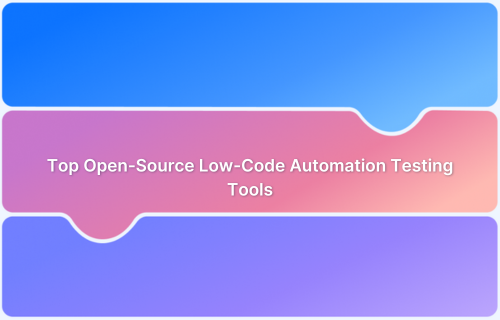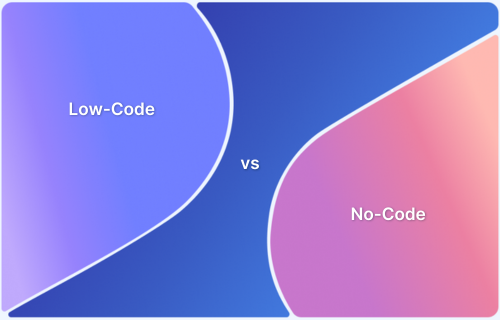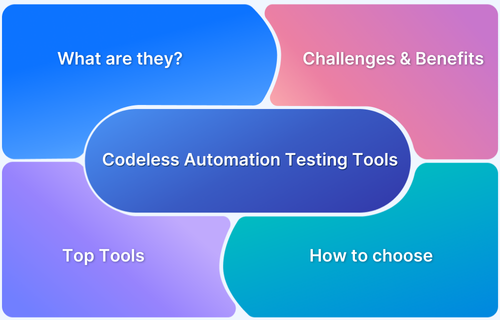Virtuoso QA is a modern test automation platform that blends low-code, no-code, and AI capabilities. Its natural-language approach makes it approachable for non-technical users, while cloud scalability helps teams automate faster.
Yet, its limitations in platform support, customization, and pricing often lead organizations to evaluate alternatives.
Overview
Top Virtuoso QA Alternatives:
- BrowserStack Low-Code Automation: AI-powered self-healing with real-device testing for web and mobile.
- Reflect.run: No-code browser testing with quick recording and automation.
- Appsmith: Open-source platform with strong integrations and flexible deployment.
- UI Bakery: Rapid internal app creation with scalable data integrations.
- Appian: Enterprise-grade automation platform for complex workflows.
- Rainforest QA: Cloud-based testing with AI stabilization and crowd QA support.
- Xano: No-code backend builder offering fast and scalable API development.
- Mendix: Full low-code platform for building web, mobile, and IoT applications.
- Studio Creatio: Workflow and CRM automation enhanced with AI-powered tools.
- Leapwork: Visual no-code automation using reusable flowcharts across platforms.
- Functionize: AI-powered web testing with Chrome-based recording and cloud execution.
- Mabl: Unified low-code platform for web and mobile testing with AI-driven self-healing.
This article explores what Virtuoso QA offers and why teams may consider other solutions.
What is Virtuoso QA?
Virtuoso QA is a cloud-first automation tool that enables test creation in plain English using natural language processing (NLP).
Combined with AI-powered element discovery and self-healing, it reduces flakiness and simplifies test maintenance.
The platform focuses primarily on web applications and supports teams looking for rapid authoring and low-maintenance test suites.
Key Features / Use Cases:
- NLP-Based Test Scripting: Create tests in plain English without coding expertise.
- AI-Powered Self-Healing: Detects and updates UI element changes automatically.
- Parallel Cloud Execution: Run tests across browsers and devices simultaneously.
- Comprehensive Test Support: Includes visual regression, data-driven, and end-to-end testing.
Why Consider Virtuoso QA Alternatives?
While Virtuoso QA offers fast authoring and is user-friendly, it may not meet every team’s testing needs.
Common Reasons To Explore Alternatives:
- Limited support for desktop and native mobile app testing.
- Advanced logic and custom scripting options are restricted.
- Premium features and enterprise support come at higher costs.
- NLP-based scripting can be less effective for highly complex scenarios
Virtuoso QA Alternatives: Quick Overview
Several platforms provide capabilities similar to or beyond Virtuoso QA. The table below highlights their pros and cons for easy comparison.
| Tool | Pros | Cons | Free Plan |
|---|---|---|---|
| BrowserStack Low-Code Automation | AI-powered self-healing, real-device testing for web and mobile | Advanced features in paid tiers | ✅ Unlimited test creation |
| Reflect.run | No-code browser testing, fast setup | Limited to web apps, pricing rises with usage | ❌ |
| Appsmith | Open-source, strong integrations, flexible deployment | Performance dips on large data-heavy pages | ✅ Up to 5 users |
| UI Bakery | Rapid internal app creation, scalable integrations | Limited mobile support, learning curve | ✅ |
| Appian | Enterprise automation, advanced governance | Expensive, steep learning curve | ❌ |
| Rainforest QA | Cloud-based automation with AI and crowd QA | Web-only, higher cost at scale | ❌ |
| Xano | Fast backend prototyping, scalable APIs | Backend only, advanced use needs expertise | ✅ Starter plan |
| Mendix | Multi-channel apps, strong collaboration | Expensive, complex governance | ✅ |
| Studio Creatio | AI-powered workflows, CRM automation | No free plan, limited mobile features | ❌ |
| Leapwork | Visual flow-based automation, cross-platform support | Expensive, setup complexity | ❌ |
| Functionize | AI-powered test creation, scalable cloud execution | Focused on web, premium features cost more | ❌ |
| Mabl | Low-code testing with AI self-healing and modular flows | Proprietary platform, subscription required | ❌ |
Top 12 Virtuoso QA Alternatives
Below are the leading platforms teams often compare with Virtuoso QA. Each tool provides distinct strengths to meet different testing and development needs.
1. BrowserStack Low-Code Automation.
BrowserStack Low-Code Automation enables teams to design, execute, and maintain tests without coding. It brings together an intuitive test recorder, AI-driven self-healing, and a real-device cloud, allowing automation to start within minutes and scale across browsers and mobile devices.
With AI authoring agents and self-healing, test creation is up to 10x faster and build failures are reduced by 40%, ensuring reliable automation for both technical and non-technical users.
Key Features of BrowserStack Low-Code Automation:
- Test Recorder: Easily capture user actions like clicks and form inputs and transform them into automated tests. This recorder supports complex functional validations including visual and text validations.
- Readable Test Steps: Actions recorded are converted into simple, human-readable English instructions, making it easy for anyone to understand and modify tests.
- Visual Validation: Enables testers to add checkpoints during recording that verify the correct display of UI components or screens, ensuring that visual elements render as expected.
- AI-Powered Self-Healing: Uses AI to detect when UI elements change and automatically updates the test to prevent failures. This minimizes the need for manual test maintenance.
- Low-Code Authoring Agent: Uses AI to turn natural language prompts into executable test steps, automating tasks from simple instructions.
- Cross-Browser & Mobile Testing: Runs tests on real desktop browsers and mobile devices in the BrowserStack cloud, covering a wide range of operating systems and devices.
- Data-Driven Testing: Allows the same test to be executed with different input values, enabling broader coverage of scenarios without creating separate tests.
- Reusable Modules:Lets teams save common sequences of steps as reusable modules that can be inserted into multiple test cases, reducing duplication and simplifying maintenance.
- API Step Integration: Adds flexibility by letting testers call APIs from within the test for tasks such as generating data, setting up test conditions, or cleaning up databases.
- Test Scheduling and CI/CD Integration: Enables automated tests to run on a set schedule or trigger directly from build pipelines via REST APIs or popular CI tools, ensuring continuous validation without manual intervention.
- Test Editing Without Re-Recording: Allows testers to open an existing test and modify, insert, or delete steps without having to re-record the whole test, saving time during maintenance.
Pricing:
- Free Plan: Offers unlimited test creation along with AI-generated test data, intelligent wait handling, API steps, secure private environment testing, video debugging, and 24×7 support.
- Paid Plan: Unlocks AI agents, advanced self-healing, parallel execution, and enterprise-grade features, with custom pricing based on organizational needs.
Get Started with BrowserStack for Free
2. Reflect.run
Reflect is a no-code end-to-end testing platform that uses an interactive cloud browser to record and automate any action on the web, making it approachable for non-technical contributors.
Key Features:
- Cloud-based browser for creating automated tests
- Automatic selector generation to reduce test flakiness
- Native CI integrations with video and log capture
Pros:
- Fast to create and maintain tests for any skill level
- Fully hosted infrastructure with detailed reporting
Cons:
- Limited to web application testing
- Costs can rise quickly with higher usage
Pricing: 14-day free trial available. Paid plans start at $212/month.
3. Appsmith
Appsmith is an open-source low-code platform for building internal tools with drag-and-drop widgets, API connections, and integrated version control.
Key Features:
- Large widget library with database and API integrations
- JavaScript customization via built-in IDE
- Git-based version control with CI/CD compatibility
Pros:
- Open-source with strong community support and flexible deployment
- Provides robust security with SSO and role-based access controls
Cons:
- May face performance issues on data-heavy or complex pages
- Advanced enterprise features require higher-tier plans
Pricing: Free for up to 5 users. Business plan costs $15/user/month. Enterprise pricing is custom.
4. UI Bakery
UI Bakery is a low-code platform for quickly building internal applications and dashboards, offering strong data connectivity and optional coding for advanced use cases.
Key Features:
- Over 100 customizable drag-and-drop UI components
- Integrates with SQL, NoSQL, REST APIs, and third-party services
- Visual workflow builder with branding and customization controls
- Support for business logic using SQL, Python, or JavaScript
Pros:
- Enables rapid development of data-driven internal apps
- Flexible integrations with diverse databases and APIs
Cons:
- Some learning curve when using advanced coding options
- Limited native support for mobile applications
Pricing: Free plan available for limited users. Paid plans start at $5/user/month or $10/developer/month, with advanced features in business and enterprise tiers.
5. Appian
Appian is an enterprise platform for process automation and case management, combining low-code and no-code experiences for complex workflows.
Key Features:
- Process modeling and case management tools
- AI/ML-driven orchestration and analytics
- Integrations with ERPs and legacy systems
Pros:
- Highly scalable for enterprise automation
- Strong governance, audit, and compliance features
Cons:
- Expensive, with pricing only on request
- Steep learning curve for business users
Pricing: Quote-based for business and enterprise customers.
6. Rainforest QA
Rainforest QA is a cloud-based no-code automation platform for web apps, combining easy visual test authoring, machine intelligence, and on-demand crowd QA for fast test coverage.
Key Features
- Visual, no-code test authoring and editing
- Self-healing/AI-stabilized test scripts
- Parallel test execution infrastructure
Pros
- Fast test creation for teams with no coding skills
- Includes all infrastructure for automation and test management
Cons
- Designed for web only, limited desktop/mobile support
- Can be expensive with high-volume or complex suites
Pricing: Custom
Read More: Top 12 AI Automation Testing Tools
7. Xano
Xano is a no-code backend platform for building APIs and workflows, designed to power front-end applications and integrate enterprise systems.
Key Features:
- Visual workflow builder for backend logic
- PostgreSQL-based relational database
- API builder for REST, GraphQL, and webhooks
Pros:
- Fast backend prototyping and deployment
- Highly scalable with modern infrastructure support
Cons:
- No built-in frontend support
- Advanced features require technical expertise
Pricing: Free plan available. Paid plans start at $25/month (Starter), $224/month (Pro), with enterprise pricing on request.
Learn More: Comprehensive Guide to Low-Code Development
8. Mendix
Mendix is a comprehensive low-code platform for building web, mobile, and IoT apps with model-driven development and AI-assisted automation, used for enterprise-scale agile delivery.
Key Features
- Visual IDE for data models, workflows, and UIs
- Integrated DevOps/project management with collaboration tools
- Cloud-native deployment (public, private, on-premises) and extensibility
Pros
- Enables collaboration across business, IT, and mixed agile teams
- Rich marketplace for templates, widgets, integrated components
Cons
- Steep learning curve for advanced logic and customization
- Pricing escalates for enterprise-grade features
Pricing
- Free tier has basic features, standard pricing is €900/month
9. Studio Creatio
Studio Creatio is a no-code platform enhanced with AI, designed for workflow, data, and CRM automation at the enterprise level. It offers strong governance and flexibility for building scalable business applications.
Key Features:
- Drag-and-drop builder for workflows and integrations
- AI-driven UI and application generation
- Pre-configured templates for common business processes
Pros:
- Enables non-technical teams to build apps with AI support
- Scales effectively for complex enterprise automation needs
Cons:
- Advanced functionality is restricted to higher pricing tiers
- Mobile capabilities are less mature compared to web support
Pricing: No free plan offered. Standard plans start at $25 per user per month.
10. Leapwork
Leapwork is a fully visual, no-code test automation tool for web, desktop, and enterprise systems, designed for rapid test creation with intuitive flowcharts and AI-powered stability.
Key Features
- Drag-and-drop flowchart-based test creator
- Self-healing tests with AI/ML
- Real-time analytics and reporting dashboards
Pros
- Fast onboarding for QA/business users and automation novices
- Strong for high-volume regression and end-to-end testing
Cons
- Some advanced automation limited without vendor onboarding
- May require infrastructure setup for optimal CI/CD use
Pricing: Custom Pricing
11. Functionize
Functionize is a codeless testing platform powered by AI, designed for web applications. It combines Chrome-based recording with a scalable cloud infrastructure to support parallel execution at scale.
Key Features:
- AI-based test creation with self-healing capabilities
- Chrome extension for fast test recording
- Cloud-hosted execution with parallel testing support
Pros:
- Simple to adopt, making it accessible for product and QA teams
- Provides stable and scalable tests with AI-driven reliability
Cons:
- Limited to web testing, without native mobile or desktop coverage
- Many advanced features are only available on higher-priced tiers
Pricing: Custom pricing available based on requirements.
Also Read: 13 Open Source AI Testing Tools
12. Mabl
Mabl is a low-code automation platform that allows both technical and non-technical users to create, run, and maintain tests for web and mobile applications. It blends simple point-and-click test creation with advanced developer options for complex workflows.
Key Features:
- Intuitive test recorder with support for web, mobile, and API testing
- AI-powered self-healing to reduce test maintenance
- Modular test flows with JavaScript and Appium snippet support
Pros:
- Accessible to users across all skill levels
- Machine learning reduces flakiness and ongoing maintenance
Cons:
- Works best for record-and-playback, complex logic requires coding
- Proprietary platform with paid subscription after trial
Pricing: Custom pricing available.
Why Choose BrowserStack Low-Code Automation?
BrowserStack Low-Code Automation delivers faster, more stable testing by combining AI-powered self-healing, low-code authoring, and real-device cloud access.
Teams can build tests in minutes, run them across thousands of real browsers and devices, and integrate seamlessly with CI/CD pipelines.
It also includes features like reusable modules, API steps, and private environment testing, making it suitable for both small teams and enterprise-scale projects.
Key Reasons To Choose BrowserStack:
- Real-Device Coverage: Test across a wide range of browsers, operating systems, and mobile devices.
- AI-Powered Efficiency: Speed up test creation and reduce failures with self-healing and AI authoring agents.
- Enterprise-Ready: Includes CI/CD integration, API testing, private environment support, and 24×7 assistance.
- Flexible Pricing: Start free with unlimited test creation, with paid plans that scale for advanced needs.
Conclusion
Virtuoso QA offers simplicity with natural-language scripting and AI-powered healing, but it comes with limitations in platform support, advanced scripting, and cost.
For organizations looking for comprehensive coverage, speed, and real-device accuracy, BrowserStack Low-Code Automation is the strongest alternative to scale testing and ensure quality at every release.







